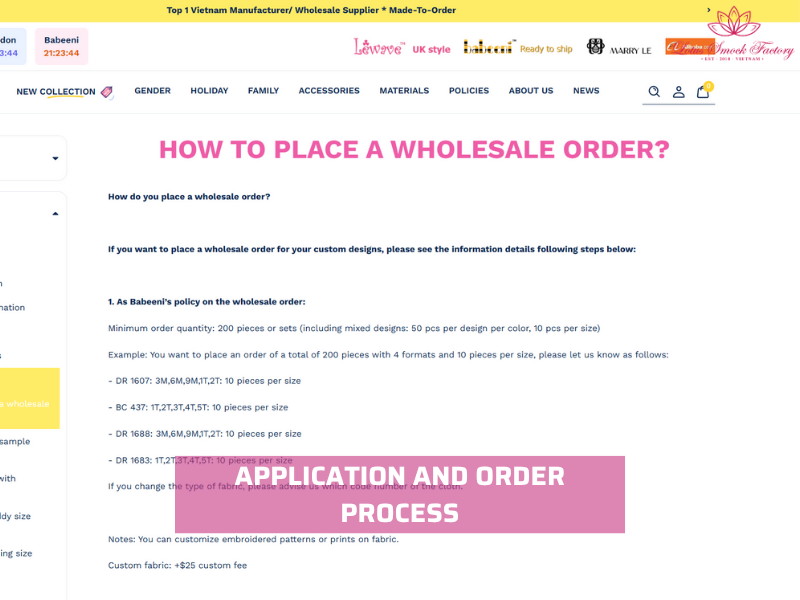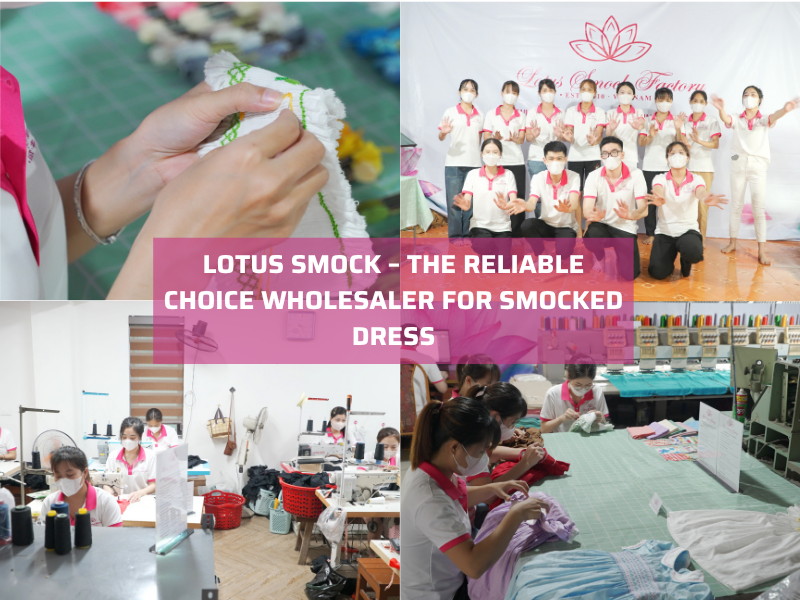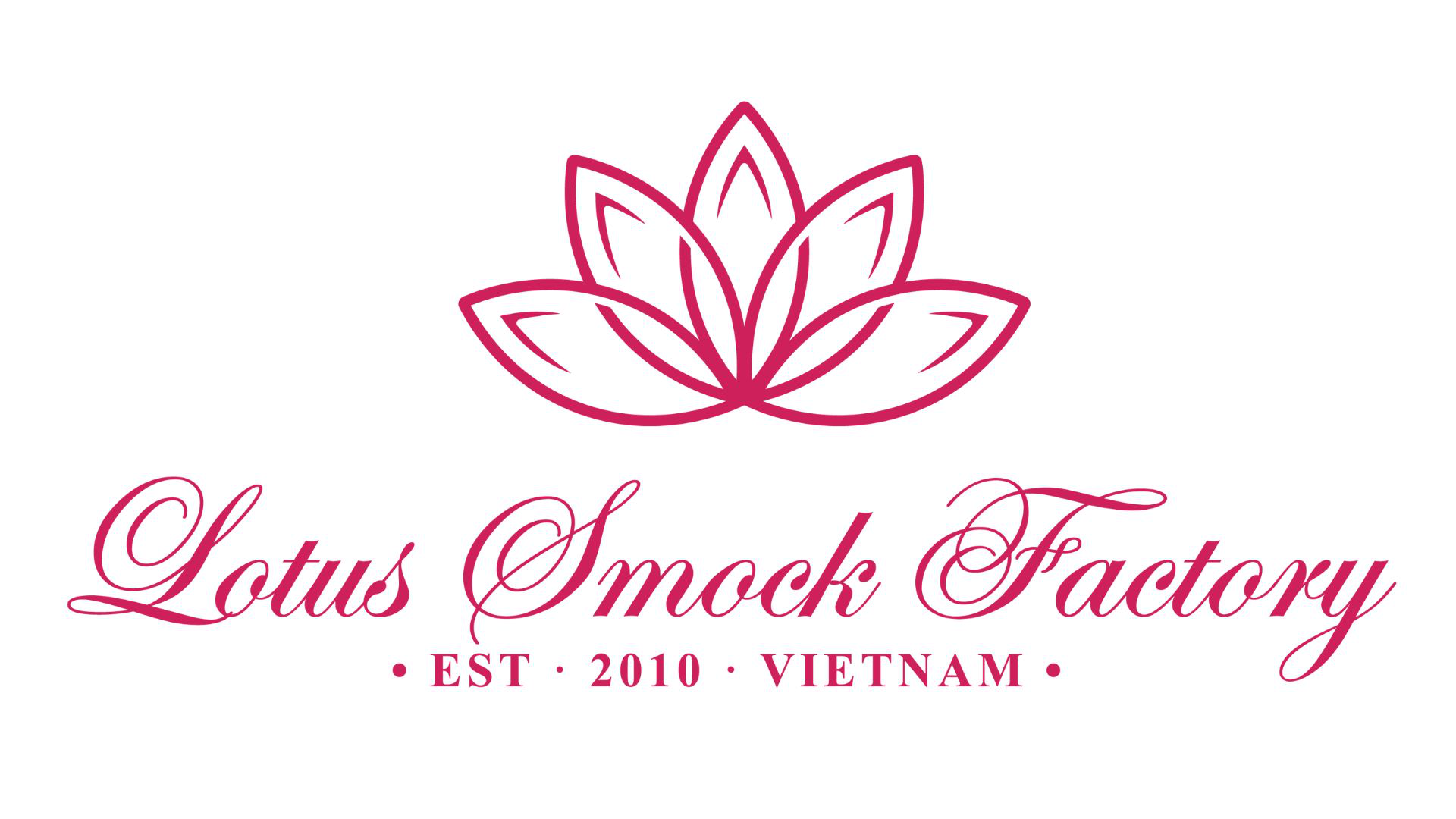Babeeni Wholesale Smock Review [Updated Guide]: Quality and Pricing
Babeeni wholesale smock review helps boutiques understand what to expect from one of Vietnam’s biggest hand-smocked clothing manufacturers. Babeeni is known for crafting baby dresses, rompers, and embroidered outfits sold across the U.S. and Europe. The brand offers handmade quality, but with higher minimum orders and longer production times.
This article breaks down Babeeni’s quality, pricing, and service based on real buyer feedback, plus introduces boutique-friendly alternatives like Lotus Smock for smaller wholesale needs.
1. Who Is Babeeni?
Babeeni is one of Vietnam’s most recognized names in hand-smocked and embroidered children’s clothing. The company has grown from a small workshop into a large-scale manufacturer with a strong international presence. Many retailers and boutiques source from Babeeni for its consistent craftsmanship, traditional smocking techniques, and affordable wholesale pricing.
1.1. Company Background
Babeeni was founded in Hanoi, Vietnam, and has operated for over 15 years in the children’s garment industry. The factory specializes in producing handmade smocked and embroidered outfits that combine traditional sewing with modern export standards.
Babeeni manufactures a wide variety of products, including:
- Baby dresses and rompers for newborns to toddlers.
- Smocked pajamas and nightwear with soft cotton fabrics.
- Embroidered outfits featuring seasonal or themed designs.
The company exports globally, focusing mainly on the U.S., European, and Australian markets. Over time, Babeeni has built a reputation as a reliable Vietnamese manufacturer offering bulk production of hand-smocked clothing.
1.2. Product Range
Babeeni’s wholesale catalog includes a variety of smocked and embroidered children’s apparel, covering both classic and holiday-themed collections.
Their main product categories include:
- Smocked dresses for girls, from casual wear to formal occasions.
- Baby sets and rompers often feature delicate hand embroidery.
- Boys’ outfits and matching sibling sets.
- Seasonal collections such as Christmas, Easter, and Back-to-School.
The factory works primarily with 100% cotton and cotton blends, prioritizing breathable materials suited for children’s skin.
For retailers seeking customized solutions, Babeeni provides OEM (Original Equipment Manufacturing) and ODM (Original Design Manufacturing) services. This allows small brands to request custom embroidery patterns, private labels, or bulk design variations.
In short, Babeeni serves as a one-stop source for hand-smocked wholesale clothing, combining traditional Vietnamese craftsmanship with export-scale production.
2. How Babeeni Wholesale Works
Babeeni operates as a made-to-order wholesale manufacturer, meaning each order is produced after confirmation. This approach helps maintain consistent quality but requires clear planning and communication between buyers and the factory. The wholesale process is straightforward but better suited for established retailers who can handle larger quantities and longer lead times.
2.1. Application and Order Process
To start a wholesale order, buyers need to submit a request directly through Babeeni.com. The company typically works with registered retailers, distributors, or private-label brands.
Steps to apply:
- Visit Babeeni.com and fill out the wholesale inquiry form.
- Provide business details such as your store name, website, or social media page.
- Confirm order details and style numbers via email or catalog reference.
Order details:
- MOQ (Minimum Order Quantity): around 100 pieces per style, depending on the collection.
- Production time: usually 30–45 working days from payment confirmation.
- Shipping: available through DHL or FedEx, with tracking support.
Babeeni recommends placing orders early, especially before Easter, Christmas, or Back-to-School seasons, to avoid production delays during peak demand.

2.2. Customization Options
Babeeni offers basic customization services for wholesale clients who want small changes to existing designs. These include:
- Embroidery color adjustments or simple motif changes for larger bulk orders.
- Private labeling for retailers with an established customer base.
However, the company does not specialize in highly customized or small-run creative orders. Retailers looking for full monogramming or design flexibility often explore boutique-scale suppliers like Lotus Smock, which provides free 2D mockups and personalized embroidery.
2.3. Payment & Logistics
Babeeni supports several payment methods suitable for international buyers, including:
- Bank transfer (TT) for larger transactions.
- Payoneer or a credit card for smaller or sample orders.
Shipping options:
- Global delivery through DHL or FedEx, with rates that vary by destination and package weight.
- Buyers are responsible for any import taxes or customs fees in their country.
Pro Insight: “Because Babeeni operates on a made-to-order model, buyers should confirm timelines and production slots early, especially before peak holidays like Christmas and Easter. Pre-scheduling helps prevent last-minute rushes and ensures smooth delivery.”
=>>> Read more: Top 10+ Smocked Dresses for Newborns That Boutiques Should Stock [Latest Update]
3. Babeeni Wholesale Smock Review: What Buyers Say
Buyer feedback on Babeeni wholesale smock products shows a mix of strong appreciation for craftsmanship and moderate concerns about communication and lead times. Most reviews confirm that Babeeni delivers genuine hand-smocked quality at competitive prices, making it a dependable supplier for boutiques that can manage larger orders and longer production schedules.
3.1. Trustpilot Feedback Summary
On Trustpilot, Babeeni holds an average rating of 4.1 out of 5 stars, reflecting overall satisfaction among global buyers.
Positive feedback highlights:
- Excellent hand-smocking quality and precise embroidery work.
- “Cute and detailed designs” that match online catalogs.
- Secure packaging and well-presented shipments.
Common complaints include:
- Slow response times during busy seasons.
- Shipping delays around holidays such as Christmas and Lunar New Year.
Many customers note that while communication may take longer, the final product quality meets or exceeds expectations, especially for large wholesale orders.
3.2. Facebook & Social Media Activity
Babeeni maintains an active presence on Facebook (Babeeni Vietnam), posting regular updates on new designs, holiday launches, and production videos. The brand interacts with customers through comments and messages, showcasing its handmade process and behind-the-scenes production work.
Social feedback overview:
- Positive comments often praise the craftsmanship and variety of children’s smocked clothing.
- Some buyers mention inconsistent replies or delays in message responses.
- Product photos and customer-shared images help build trust and transparency.
Across TikTok and Instagram, smaller boutiques also feature Babeeni’s products, emphasizing their authentic handmade aesthetic and classic design appeal.
3.3. Overall Reputation
Babeeni is widely regarded as a reliable large-scale Vietnamese manufacturer specializing in hand-smocked garments. Its strength lies in craftsmanship, backed by experienced artisans and years of export experience.
However, the company’s factory-scale structure means communication can feel formal or slower compared to boutique-level suppliers. Still, for buyers who value authentic handmade production and can manage larger minimum orders, Babeeni remains one of the most established names in Vietnam’s smocked clothing export market.
4. Pros and Cons of Babeeni Wholesale
Babeeni is one of the most recognized names in Vietnam’s smocked clothing industry. Its long-standing reputation and handmade production make it attractive to established retailers. However, some factors, such as high minimum orders and slower production, may not suit smaller boutiques or startups.
Here’s a clear overview of the advantages and challenges when working with Babeeni wholesale.
Pros
- Hand-smocked by artisans in Vietnam: Each piece is handmade with detailed stitching, giving authentic craftsmanship that machine embroidery can’t replicate.
- 15+ years in production: Decades of experience make Babeeni one of the most consistent smocked clothing factories in Southeast Asia.
- Global export experience: Ships regularly to the U.S., Europe, and Australia, with stable logistics systems.
- Wide product range: Offers dresses, rompers, baby sets, pajamas, and seasonal collections.
- Affordable pricing compared to Western suppliers: Wholesale prices are lower than European or U.S. factories, helping retailers achieve better profit margins.
Cons
- Higher MOQ (around 100 pcs per style): This requirement can limit small boutiques that want to test multiple styles in small batches.
- Longer turnaround (30–45 working days): As a made-to-order factory, production takes time, especially during high-demand seasons.
- Mixed communication feedback: Some buyers mention slower replies or inconsistent updates during order tracking.
- Limited design customization: Babeeni focuses on preset designs with small embroidery or color adjustments only.
- Wholesale details not clearly listed online: Buyers often need to contact the company directly for pricing and MOQ confirmation.
Tip: “Babeeni fits established retailers that can manage larger inventories and plan orders ahead. Small boutiques testing new lines may prefer flexible, low-MOQ alternatives like Lotus Smock, which combines handmade quality with faster turnaround and customizable designs.”
5. What to Know Before Ordering from Babeeni
Ordering from Babeeni wholesale can be a smooth process if you prepare and communicate clearly. Since the company operates on a made-to-order model, understanding its workflow and planning in advance helps avoid production or delivery issues. Here are four key points every boutique should consider before placing an order with Babeeni Factory Vietnam.
5.1. Confirm MOQs Early
Babeeni’s minimum order quantity (MOQ) usually starts at around 100 pieces per style, though it may vary depending on the design or season. Always confirm the exact MOQ before finalizing your order.
- Ask for clarification on whether the MOQ applies per color, size, or total quantity.
- Avoid miscommunication by requesting written confirmation through email.
This step prevents unexpected adjustments in your invoice or production schedule later on.
5.2. Request Fabric Swatches or Sample Photos
Before bulk production, request fabric swatches or sample images to verify color tones, embroidery placement, and stitching detail.
- This step ensures that the final garments match your store’s color palette and quality standards.
- Small lighting or dye differences may occur during production, so a pre-production check is always recommended.
Babeeni usually provides digital photos of fabric and embroidery patterns upon request, especially for larger wholesale orders.
5.3. Communicate Deadlines Clearly
Babeeni’s production time is typically 30–45 working days, depending on order size and season. To stay on schedule:
- Discuss your preferred delivery date and ask for confirmation in writing.
- Include shipping buffer time (especially for DHL or FedEx deliveries).
- Follow up one week before the planned dispatch to confirm progress.
Clear, early communication helps the factory manage your production slot and avoid last-minute delays.
5.4. Check Holiday Schedules
Vietnam observes several national holidays that can temporarily pause factory operations, especially Tet (Lunar New Year) and New Year’s Day.
- During these periods, production and shipping may be delayed by 7–14 days.
- Plan orders at least one month earlier if your delivery overlaps with these holidays.
Understanding local production schedules allows you to plan efficiently and maintain consistent stock for your boutique.
=>>> Read more: Top 10+ Smocked Pumpkin Dress Models for Your Boutique This Fall
6. Babeeni vs Lotus Smock: Which Fits Your Boutique?
Both Babeeni and Lotus Smock are based in Vietnam and specialize in smocked and embroidered children’s clothing. However, they serve different types of buyers. Babeeni focuses on large-scale, export-ready production, while Lotus Smock caters to small boutiques seeking artisan-made clothing in smaller, customizable quantities. Understanding these differences helps you choose the right supplier for your boutique’s scale and goals.
| Criteria | Babeeni | Lotus Smock |
| Location | Vietnam (factory-scale operation) | Vietnam (boutique-focused production) |
| MOQ | 100 pcs per style | 30 pcs per style |
| Production Style | Mass handmade factory | Small-batch, artisan hand-smocking |
| Customization | Limited color or embroidery changes | Full customization, including monograms and free 2D mockups |
| Shipping Time | 30–45 days | 30–35 days + 5–7 day FedEx worldwide shipping |
| Target Buyer | Distributors, wholesalers, and established stores | Small boutiques, startup resellers, and private-label brands |
| USP | Large inventory and export efficiency | Boutique-level craftsmanship and personalized service |
Key Insights:
- Babeeni works best for distributors or retailers that can manage bulk orders and have predictable seasonal demand. The company provides factory consistency but offers less design flexibility.
- Lotus Smock, on the other hand, fits smaller boutiques that prioritize customization, flexible MOQs, and close communication with their supplier. Each piece is hand-smocked by skilled artisans, giving it the premium, heirloom-level finish that boutique buyers value.
Tip: “Boutiques working with Lotus Smock often reduce overstock risk by up to 70%, thanks to smaller MOQs and the ability to pre-sell collections using free digital mockups before production.”

7. Final Words
Babeeni remains a trusted name for wholesale hand-smocked clothing, especially for established retailers who can handle larger orders. Its craftsmanship reflects years of experience, though some boutiques may find its MOQ and lead time challenging.
For smaller stores seeking handmade quality with more flexibility, Lotus Smock offers the same artisanal touch with faster production and global delivery.

